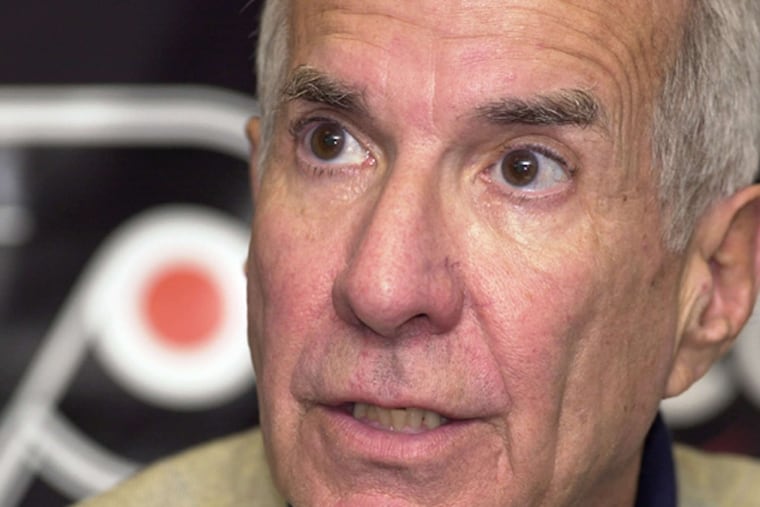Five lessons from the founding Flyer
A BRIGHT LIGHT went out Monday with the death of Flyers founder and Comcast Spectacor chairman Ed Snider. Last year, I had the privilege of sitting next to Ed during a Flyers game at the Wells Fargo Center while he patiently explained the rules of hockey to me. He beamed with pride when I recognized "icing" for what it was.

A BRIGHT LIGHT went out Monday with the death of Flyers founder and Comcast Spectacor chairman Ed Snider. Last year, I had the privilege of sitting next to Ed during a Flyers game at the Wells Fargo Center while he patiently explained the rules of hockey to me. He beamed with pride when I recognized "icing" for what it was.
In my role as the inaugural director of the Ed Snider Center for Enterprise and Markets at the University of Maryland's Robert H. Smith School of Business, I learned many more things from this sports and entertainment business legend.
Here are five such lessons related to his belief in the value of enterprise - moving progressively from the enterprising individual to enterprising teams to a virtuous system that links enterprising organizations.
1. "Money is the reward, not the reason."
Ed understood that enterprising people are motivated from within. They welcome the challenge of doing hard things that others dismiss as impossible - such as bringing back-to-back Stanley Cups to a city that had previously failed to support professional hockey. "Of the six expansion franchises in 1967, we were voted the least likely to succeed," Ed said on Sept. 29, during his last visit to the University of Maryland. "Fortunately, I was young enough not to know what I was getting into." Wealth often comes with success, but enterprising people work hard and take risks for other reasons. "You enjoy creating things, building things, and making things better."
2. "I have always enjoyed everything I do."
Ed loved what he did, and he was good at it. He celebrated being part of something bigger than himself. Whether mopping floors as a teenager at his parents' grocery store in Washington, D.C., or running a multibillion-dollar enterprise, he took satisfaction in a job well done. The virtuous combination of high aspiration and ability channeled toward a higher purpose also made Ed's attitude contagious. People with similar ethics and values wanted to be around him and share in his vision. "I always felt that what I liked, everyone else would like," he said. "I was just a regular guy."
3. "Look for good people, and let them do their job."
Ed hired people for their minds, not to follow orders. Rather than seeking affirmation, he encouraged people to disagree with him. "We want individuals who are going to take initiative on their own, not be 'yes' people, and not be afraid to make a mistake," he said. I experienced this mindset firsthand during my first conversation with Ed, when we argued about what words would follow his name in the title of the new center we were creating. "It's not important what I want the name to be," Ed said about the center whose mission he passionately believed in. "You are the director, and you will be running it, so what matters is what you want the name to be."
4. "When you create a company and you create jobs and opportunity for all kinds of people, that is great success."
Some people think business is mostly about competition, but Ed saw enterprise as a way of bringing people together and pointing them in the same direction to do something great. Through the organizations that result, people from all backgrounds and interests can do what they enjoy while contributing to the same mission. I remember a conversation with a security guard in the downstairs lobby of the Wells Fargo Center before the Flyers game last year. The man's eyes shone with pride as he recounted his first promotion 20 years earlier, from a part-time parking lot attendant to a full-time employee. I could see the quiet dignity in his manner as he attended to his job, and the sprint in his steps to open the door when he saw Ed drive in. In a different but similar way, Flyers players contribute their talents on the ice. They are in a playoff series against the Washington Capitals, their midseason turnaround attributed to their visit with Ed in California last December. Enterprise creates room for everyone to succeed and to help the organization succeed, too.
5. "Capitalism is a beautiful system."
Markets result when different individuals and enterprises come together within an ecosystem. While the earlier lessons show that collaboration, not competition, is the hallmark of capitalism, even rivals can benefit from one another. This is especially obvious in sports. Few people would come to watch the Flyers shoot pucks into an empty net every night. Ed, who quit his first job as an accountant to pursue a different path, viewed capitalism as a tool for mobility - and not only in the material realm. He also believed it enables the growth of the human spirit. Capitalism creates dignity and self-esteem in people who are engaged in voluntary trade, because they become independent equals, neither seeking nor giving alms. He treated everyone this way. I watched him greet a woman sweeping the floor with the same warmth and affection as he did Dave Scott, the CEO of Comcast Spectacor. As Dave noted, there was only one Ed. There wasn't a businessman Ed or a hockey Ed or a family man Ed.
Indeed, Ed is the one encounter in my life that can never be repeated. He provided lifelong learning and a guiding light that will remain within us all.
Rajshree Agarwal is the director of the Ed Snider Center for Enterprise and Markets at the University of Maryland's Robert H. Smith School of Business and a Cato Institute adjunct scholar.